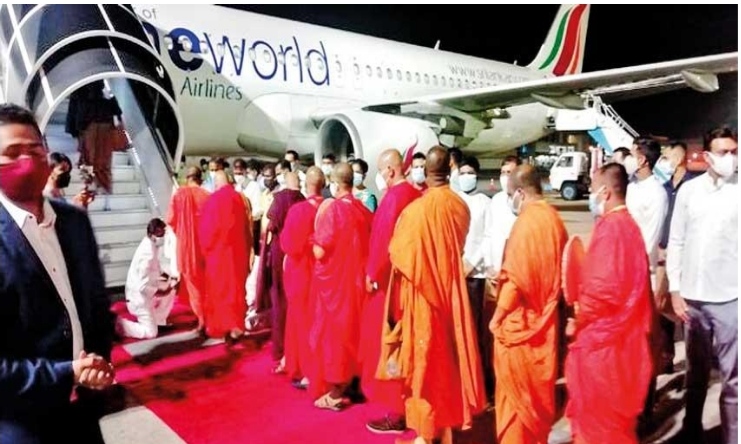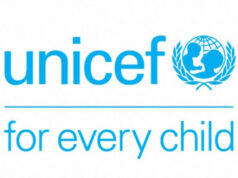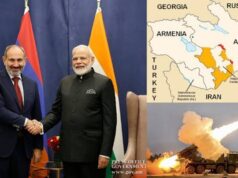India lays emphasis on culture diplomacy with Sri Lanka
By
Kelum Bandara

Indian Prime Minister Narendra Modi inaugurated the International Airport in Kushinagar on October 20 on the auspicious Vap Poya Day.
India has wider scope for culture diplomacy with Sri Lanka since it can relate to Buddhists and Hindus who, together, account for more than 80 percent of Sri Lanka’s population
The Modi government has taken a keen interest in fostering and promoting ties based on Buddhism and Hinduism
Indian Prime Minister Narendra Modi wanted to inaugurate the Kushinagar International Airport with the landing of an aircraft from Sri Lanka with a high profile delegation on board. A flight with five Cabinet and State Ministers, and 100 members of the Buddhist clergy descended to the airport on October 20 heralding the opening of the airport. It is beneficial for tourism between the two countries. For India, Sri Lanka is a large source market for Buddhist tourism. Likewise, India is the largest Poji market for tourism in Sri Lanka.
The inaugural flight to Kushinagar, which is the place where the Buddha attained ‘Mahaparinibbana’, is a landmark event that symbolises India’s application of soft power based on historical Buddhist ties between the two countries. Cultural ties feature a lot in bilateral relations, and it has been taken to new heights by both sides in recent years. India has wider scope for culture diplomacy with Sri Lanka since it can relate to Buddhists and Hindus who, together, account for more than 80 percent of Sri Lanka’s population. It is the best tool in diplomacy build goodwill with each other as the basis to open out to other matters of significance. The Modi government has taken a keen interest in fostering and promoting ties based on Buddhism and Hinduism – the two noble religions that originated on Indian soil in ancient history. Prime Minister Modi took some steps in this direction.
India committed US $ 15 million in grant assistance to develop Buddhist heritage in Sri Lanka. In fact, Indian High Commissioner Gopal Baglay has been instructed to make sure that US $ 3 million out of this total commitment is spent annually. Every Indian dignitary makes it a point to pay homage to the places of Buddhist religious significance in Sri Lanka, be it Sri Dalada Maligawa or Jaya Shri Maha Bodhi. The foreign policy orientation is obvious in this manner.
Along such culture diplomacy, India is keen on enhancing connectivity with Sri Lanka more and more. It became apparent during the visit of Indian Foreign Secretary Shri Harsh Vardhan Shringla. He undertook an official tour of Sri Lanka for three days from October 2 to 5. This was his first visit to Sri Lanka in his current capacity
Scepticism
In Sri Lanka, particularly among the Sinhalese, there is scepticism about Indian economic projects. Be it whatever party, the opposition is always critical of projects involving India. Most of Indian projects in Sri Lanka are stuck without being able to be implemented due to the political agitation. Some of the projects such as the development of the East Container Terminal never took off the ground, and was finally abandoned even at the cost of bilateral ties. Culture diplomacy is an effective tool in building a reservoir of goodwill among people in that context.
Along such culture diplomacy, India is keen on enhancing connectivity with Sri Lanka more and more. It became apparent during the visit of Indian Foreign Secretary Shri Harsh Vardhan Shringla. He undertook an official tour of Sri Lanka for three days from October 2 to 5. This was his first visit to Sri Lanka in his current capacity. He called on President Gotabaya Rajapaksa, Prime Minister Mahinda Rajapaksa, Finance Minister Basil Rajapaksa and Foreign Minister Prof. G.L. Peiris. He held meetings and discussions with State Minister for Estate Housing and Community Infrastructure Jeevan Thondaman, Foreign Secretary Admiral (Retd) Prof. Jayanath Colombage and Defence Secretary General (Retd) G.D.H. Kamal Gunaratne.
During his meeting with the President on October 05, 2021, the Indian Foreign Secretary underscored the importance India attaches to expeditiously taking forward mutually beneficial projects, including proposals to enhance air and sea connectivity between India and Sri Lanka.
He mentioned ferry connectivity between the two countries. Also, he reiterated India’s position on complete implementation of the provisions of the 13th Amendment to the Constitution, and the conduct of the provincial council elections at the earliest.
In his meeting with the Prime Minister held on October 04, 2021, Foreign Secretary mentioned that India-Sri Lanka relations are underpinned by vibrant people-to-people ties which would be further strengthened with signing of the Inter-Governmental MoU for the USD 15 million grant for developing Buddhist heritage
In his meeting with the Prime Minister held on October 04, 2021, Foreign Secretary mentioned that India-Sri Lanka relations are underpinned by vibrant people-to-people ties which would be further strengthened with signing of the Inter-Governmental MoU for the USD 15 million grant for developing Buddhist heritage.
Recalling India’s strong cultural and civilizational links with Jaffna, he informed that India would extend support to Sri Lanka for the maintenance of the Jaffna Cultural Centre built with Indian grant assistance.
The meeting with Minister of Finance focussed on the strong economic and commercial relations between India and Sri Lanka. In this connection, both sides agreed to make progress on joint projects, including those under the loan and grant assistance extended by India. Foreign Secretary held wide-ranging and comprehensive discussions with the Foreign Minister and the Foreign Secretary on all areas of mutual interest, including on the need to face the challenges posed by the Covid-19 pandemic together to mitigate its economic impact.
During the visit, he travelled to Kandy, Trincomalee and Jaffna, signifying their cultural, economic and historical importance, respectively. In Kandy, Foreign Secretary paid homage Sri Dalada Maligawa. In Trincomalee, he visited the Oil Tank Farms, a symbol of the potential and strong energy partnership between India and Sri Lanka where LIOC (Lanka Indian Oil Company) briefed him about the development undertaken by it at the Lower Tank Farms and its advantages to Sri Lanka’s economy. During his visit to Jaffna, Foreign Secretary inspected the Jaffna Cultural Centre and interacted with the Governor of Northern Province, several Members of Parliament, academicians and business leaders.
India committed US $ 15 million in grant assistance to develop Buddhist heritage in Sri Lanka. In fact, Indian High Commissioner Gopal Baglay has been instructed to make sure that US $ 3 million out of this total commitment is spent annually
At an event held at Temple Trees, the Foreign Secretary jointly inaugurated and handed over four development cooperation projects completed through Indian grant assistance with the respective line Ministers in a virtual mode.
Expressing his happiness at the joint inauguration, Foreign Secretary underlined that completion and handing over of the new housing and educational infrastructure is in line with the abiding commitment of Government of India to assist Sri Lanka in its socio-economic development. These projects also reflected the people-centric nature and range of India’s development partnership with Sri Lanka.
India’s political interests in Sri Lanka came up once again during the visit. In this respect, the Foreign Secretary met with the Tamil National Alliance (TNA) delegation led by its leader MP R. Sampanthan, Tamil Progressive Alliance (TPA) delegation led by MP Mano Ganesan; and Ceylon Workers Congress (CWC) delegation led by Mr. Jeevan Thondaman. Foreign Secretary reiterated to them India’s longstanding support for the reconciliation that addresses aspirations of the Tamil community for equality, justice, peace and dignity within the united Sri Lanka and in accordance with the 13th Amendment.
While fostering cultural ties based on Buddhism and Hinduism, India has greater interests in other areas covering economic, political and geopolitical aspects.
Source : Daily Mirror




